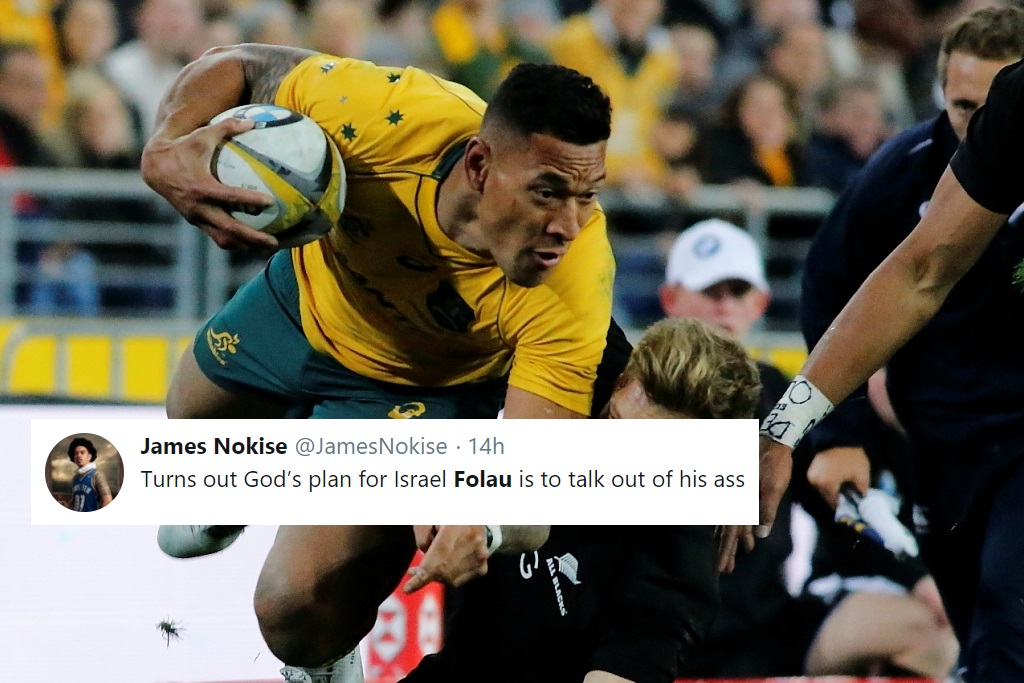LGBTIQ Activists Slam “Folau Clause” In Proposed Religious Discrimination Bill
“I just have serious concerns about a number of issues in relation to it [the bill] and the Folau clause is a major concern.”

LGBTIQ advocates have criticised a controversial proposed religious discrimination bill, urging the Morrison government to make significant changes to protect minority groups from being harmed by the legislation.
The highly criticised religious discrimination bill has been a long time coming, after being first proposed by Prime Minister Scott Morrison back in 2018. At the time, Morrison promised to introduce legislation “to make it unlawful to discriminate on the basis of a person’s religious belief or activity, including on the basis that a person does not hold any religious belief or does not engage in any religious activity”.
The bill’s progress is now being led by Michaelia Cash, who took over the role of Attorney-General — and the bill — after Christian Porter stepped down back in March.
Now, a third iteration of the legislation draft is under consultation as the government tries to fulfil an election promise before we head to the polls again next year.
Cash met with religious and LGBTIQ community leaders last week to discuss the bill, which has received backlash for not adequately protecting vulnerable groups from discrimination — AKA the entire reason for the bill in the first place.
According to Equity Australia CEO Anna Brown, the current draft is “deeply flawed” and could undermine access to vital healthcare services and allow for workplace discrimination on so-called religious grounds.
“It was because of these provisions that a broad chorus of voices spoke out against the bill, from industry, unions, people of faith, women, people with a disability and LGBTIQ people,” Brown told The Guardian Australia.
“This coalition is coming back together over coming weeks to highlight the level of community opposition to laws that would take us backward. We urge the government to listen and to abandon proposed laws that would privilege religious institutions and entrench new forms of discrimination.”
Particularly, LGBTIQ leaders are concerned about the so-called “Folau clause”, which is named after disgraced rugby player Israel Folau who famously got sacked after sharing a homophobic Instagram post that asserted gay people were destined for hell.
The Folau clause — if passed — would give legal protection to people expressing a religious statement of belief. This not only means that Israel Folau’s dismissal would be considered religious discrimination, but would also allow health practitioners to refuse treatment based on religious grounds, and allow religious institutions to discriminate against staff.
The Australian Christian Lobby’s Martyn Iles boasted about the inclusion of the clause last month, asserting that the ACL was “very, very strongly applying pressure from a grassroots level and from our lobbying level to ensure the Folau clause remains in the bill”.
“It was fought tooth and nail, it was really at risk for a long time there one great win is that the final draft of the bill will contain a Folau clause. It’s not perfect, but it’s not bad. And it does exist within the bill,” he said in a now-deleted podcast episode, according to the Sydney Morning Herald.
However, it’s worth noting that a number of Liberal MPs have criticised or expressed reservations about the bill, indicating that they are prepared to cross the floor over the legislation, which will be introduced in the final sitting fortnight of 2021.
“I just have serious concerns about a number of issues in relation to it [the bill] and the Folau clause is a major concern,” Liberal MP Warren Entsch told The Guardian Australia.
Entsch is one of many Liberal MPs who have vocally criticised the bill.
While religious discrimination is undoubtedly an issue we must be fighting against, it’s of utmost importance that the introduction of this bill doesn’t inadvertently result in other vulnerable groups becoming victims of discrimination and hate.

